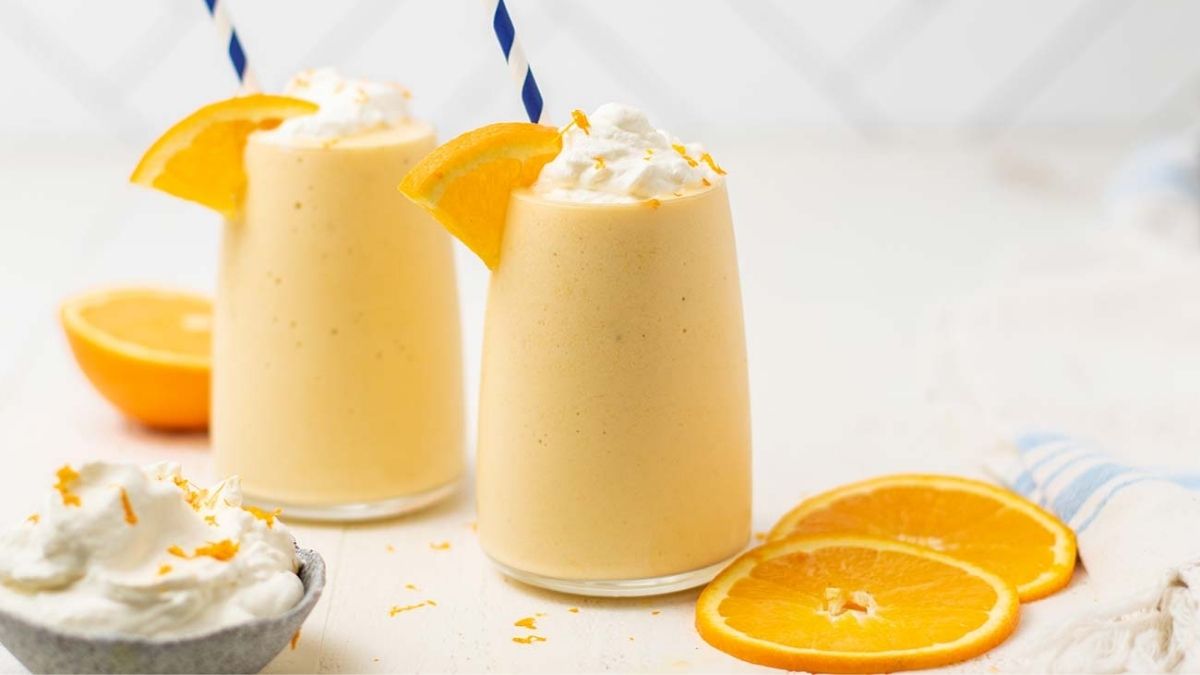Healthy Orange Julius Smoothie is created with natural fruit and contains no added sugars – the 20 grams it contains come straight from the oranges and banana. Because it’s created with whole ingredients, it also offers a healthy dose of fiber, Vitamin A, calcium, and iron. Orange Julius recipes have circulated, but I was always doubtful, and I believed they could never compare to the “genuine thing,” Even though I haven’t tasted the real thing in at least 25 years, that drink remained a pillar of my memory. However, I recently attempted to make an Orange Julius at home. As it turns out, it’s not only comparable to the “genuine thing.”
If you’ve never had this fizzy beverage, you’re in for a treat! Orange Julius is a frozen orange juice concentrate cocktail made with milk, vanilla, sugar, and ice. It’s not exactly a smoothie; it’s far too sugary — more akin to a dessert — to qualify. Additionally, it is not as creamy or as thick as a milkshake. It’s sweet and bubbly, with a hint of ice cream, and tastes identical to a Creamsicle.
How To Make Orange Julius?
A frothy vanilla-orange smoothie is all that is required for an Orange Julius. When I was a child, my mother made them at home for us by blending solid orange juice with ice and vanilla, and that is where the inspiration for this simple Orange Julius recipe came from.
Because the one from the mall is light and creamy, I prefer to add almond or coconut milk. Additionally, I feel that using whey protein isolate gives it that frothy and light texture and adds protein to make it more satiating.
Step 1: In a blender, combine peeled oranges, frozen bananas, almond milk, ice, and vanilla extract. If using whey protein (which I highly recommend! ), add it now.
Step 2: Puree the smoothie in a food processor until light and foamy.
Step 3: Serve the smoothie immediately to maintain its cold temperature!
Step 4: Garnish the smoothie, if preferred, with orange zest and whipped cream. Utilize a vegan protein powder and coconut whipped cream to make this orange smoothie vegan.
Are Oranges Good In Smoothies?
I didn’t begin using whole oranges in smoothies until I purchased a Vitamix, and that gadget is capable of blending virtually anything into a smooth texture. Because I used fresh oranges in this smoothie rather than frozen, it will also work in a standard blender.
Oranges give a tonne of sweetness and a tangy flavor to smoothies that I adore – and while this fruit is frequently disregarded at smoothie bars, it should not be!
What Are The Health Benefits Of Orange Julius?
Orange juice is consumed worldwide. It is manufactured manually or commercially by squeezing oranges to get the juice. It naturally contains a high concentration of essential minerals, including vitamin C and potassium. Additionally, commercial cultivars are frequently calcium and vitamin D fortified. Nonetheless, there is debate over whether it adds to a healthy diet or not.
Orange juice has five health benefits.
1. Rich In Several Important Nutrients
Orange juice is a good source of various vitamins and minerals, including vitamin C, folate, and potassium. A serving of orange juice of 8 ounces (240 mL) contains around orange juice is a high source of vitamin C. This water-soluble vitamin acts as an antioxidant and is required for proper immunological function.
Additionally, vitamin C aids in the creation of bone, the healing of wounds, and the maintenance of healthy gums. Orange juice is also high in folate, a nutrient required for DNA synthesis and development of the fetus. Not to mention, it’s a good source of potassium, a mineral that helps control blood pressure inhibits bone loss, and protects against heart disease and stroke.
2. High In Antioxidants
Orange juice antioxidants improve health by reducing oxidative damage – a state in which antioxidants outnumber dangerous chemicals called free radicals. As evidenced by research, antioxidants are critical for overall health maintenance, and they may even assist in preventing chronic diseases such as heart disease, cancer, and diabetes. Orange juice contains flavonoids, carotenoids, and ascorbic acid, all antioxidants.
One eight-week study discovered that daily drinking 25 ounces (750 mL) of orange juice significantly boosted antioxidant status. Another study found that consuming 20 ounces (591 mL) of orange juice daily for 90 days improved the total antioxidant status of 24 adults with elevated cholesterol and triglycerides. Additionally, in a study involving over 4,000 adults, orange juice was identified as a significant source of antioxidants in the ordinary American diet, alongside tea, berries, wine, supplements, and vegetables.
3. May Help Prevent Kidney Stones
Kidney stones are minute mineral deposits that build up in the kidneys, frequently causing severe discomfort, nausea, and blood in the urine. Orange juice can raise the pH of urine, so making it more alkaline. According to studies, maintaining a higher, more alkaline urine pH may help prevent kidney stones.
Orange juice was more helpful than lemonade at reducing many kidney stone risk variables in short research. Another study of 194,095 participants discovered that those who drank orange juice at least once a day had a 13% lower chance of developing kidney stones than those who drank less than one serving per week.
4. May Improve Heart Health
Heart disease is a severe condition that claims over 17 million lives worldwide. According to research, drinking orange juice may help reduce numerous heart disease risk factors — such as high blood pressure and excessive cholesterol — and maintain a healthy, powerful heart. For instance, one study found that long-term orange juice drinking decreased both total and “bad” LDL cholesterol levels in 129 participants.
Additionally, a review of 19 trials found that consuming fruit juice was beneficial in lowering people’s diastolic blood pressure (the lowest reading on a reading). Additionally, orange juice has been demonstrated to enhance “good” HDL cholesterol levels in persons with elevated levels, benefiting heart health.
5. May Decrease Inflammation
Acute inflammation is a natural component of the immune system’s defense against sickness and infection. However, it is believed that long-term maintenance of high levels of inflammation contributes to the development of chronic disease. Increased inflammatory indicators such as C-reactive protein (CRP), interleukin-6 (IL-6), and tumor necrosis factor (TNF-) have all been shown with illnesses such as metabolic syndrome, heart disease, and some malignancies.
According to some research, orange juice may help reduce inflammation and the issues associated with it. According to one review, orange juice has anti-inflammatory effects that may help lower levels of specific inflammatory markers associated with chronic disease. Additionally, eight-week research of 22 adults found that drinking both fresh and commercial orange juice decreased inflammation markers such as CRP and IL-6 — which may benefit disease prevention.
How Does An Orange Smell?
We are all familiar with the perfume of orange; like all citrus, it is bright and joyful, evocative of summer, and pleasant weather. Orange is a top note in fragrance blending and pairs nicely with warm smells such as cedarwood, juniper, clove, frankincense, lavender, and sandalwood. Oranges have a distinct aroma that can be detected several yards away, but apples and strawberries do not. Terpenes are a class of chemicals found in citrus fruit, and they have a distinct odor. Citrus fruits smell due to chemicals such as limonene or pinene.
What Flavor Is Orange Julius?
Orange Julius is a blended frozen beverage made with sweetened orange concentrate. It’s a drink, milkshake, and smoothie all rolled into one – it tastes like a creamsicle! Oranges have a sweet-tart flavor and are frequently peeled and eaten fresh or juiced. It has a thick, bitter rind that is typically removed but can be cooked with. Scrape off the outermost layer of the rind to generate zest, which has a flavor identical to the flesh.
Conclusion
This refreshing, creamy beverage originated at Julius Freed’s orange juice stand in Los Angeles in the mid-1920s. After several years of sluggish sales, a new, creamier, more foamy beverage was developed to offset the acidic orange juice. It was a smashing success. The crowd began forming a queue outside the store, yelling, “Give me an orange, Julius!” As a result, the drink‘s name was born.
Orange juice is a popular beverage that contains a high concentration of antioxidants and micronutrients such as vitamin C, folate, and potassium. Consumption has been linked to several health benefits, including enhanced heart health, lower inflammation, and a decreased chance of kidney stones. However, because it is high in calories and sugar, it is advisable to take it in moderation and choose freshly squeezed or 100% orange juice.

